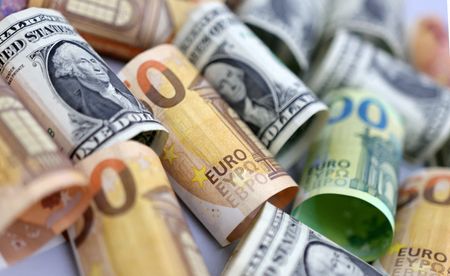By Sinéad Carew and Alun John
NEW YORK/LONDON (Reuters) -MSCI’s global equities gauge rose on Thursday, while Wall Street stocks were choppy and U.S. Treasury yields fell in response to a mixed bag of economic data and Federal Reserve commentary about interest rate cuts.
Wall Street surged on Wednesday after data showed easing in U.S. core inflation. While Thursday’s data included a U.S. retail sales increase in December, it was below expectations.
Meanwhile, the number of Americans filing new applications for unemployment benefits increased more than expected last week but remained at levels consistent with a healthy labor market.
U.S. Treasury yields slipped in a choppy market, with investors reacting to Federal Governor Christopher Waller saying three or four interest cuts this year are still possible if U.S. economic data weakens further.
“Our base case is still two cuts this year and that’s predicated on the notion that we will get some slowing inflation,” said Robert Tipp, chief investment strategist and head of global bonds at PGIM Fixed Income in New York.
With Donald Trump due to be inaugurated on Jan. 20, investors were closely monitoring U.S. Senate Finance Committee testimony from Scott Bessent, the president-elect’s nominee to lead the Treasury Department.
Bessent said extending Trump’s 2017 tax cuts was a top priority. This was after he said in prepared remarks that the U.S. must prioritize investing to grow the economy over “wasteful spending that drives inflation.”
While investors have been hoping for fewer regulations under Trump they have been dealing with the uncertainty of whether his tariff policies would push inflation higher.
On Wall Street, stocks flitted between green and red a day after its three major indexes registered their biggest daily percentage gains since the Nov. 6 rally following the U.S. presidential election.
At 12:04 p.m. the Dow Jones Industrial Average rose 35.73 points, or 0.08%, to 43,256.26, the S&P 500 rose 6.92 points, or 0.12%, to 5,956.91 and the Nasdaq Composite fell 46.36 points, or 0.24%, to 19,464.88.
MSCI’s gauge of stocks across the globe rose 3.22 points, or 0.38%, to 850.52.
Europe’s STOXX 600 index rose 0.98%, with luxury stocks boosted after Cartier jewellery owner Richemont’s results exceeded analyst expectations.
And chip stocks around the world were supported after Asian chipmaker Taiwan Semiconductor Manufacturing Co reported a record quarterly profit in line with expectations.
MSCI’s broadest index of Asia-Pacific shares outside Japan had closed up 1.29%, while Japan’s Nikkei rose 0.33%.
In currencies, the dollar index, which measures the greenback against a basket of currencies including the yen and the euro, fell 0.07% to 108.95.
The euro was up 0.12% at $1.0301.
Against the Japanese yen, the dollar weakened 0.68% to 155.4 after comments from Governor Kazuo Ueda prompted traders to price in a more than 70% chance the Bank of Japan will raise interest rates next week.
In bonds, the yield on benchmark U.S. 10-year notes fell 3.6 basis points to 4.617%, from 4.653% late on Wednesday while the 30-year bond yield fell 2.7 basis points to 4.8514%.
The 2-year note yield, which typically moves in step with expectations for Fed interest rate policy, fell 2.1 basis points to 4.243%, from 4.264% late on Wednesday.
In commodities, oil prices slipped with Yemen’s Houthi militia expected to halt attacks on ships in the Red Sea, while investors digested the complex ceasefire accord between Israel and militant group Hamas.
U.S. crude fell 2.06% to $78.39 a barrel and Brent fell to $80.81 per barrel, down 1.49% on the day.
And U.S. natural gas futures held near a two-year high on colder weather forecasts for the Martin Luther King Jr. Day holiday weekend, which could cut output by freezing gas wells and pipes even as demand for heating fuel rises to a record high.
Spot gold rose 0.93% to $2,720.89 an ounce. U.S. gold futures rose 0.77% to $2,733.50 an ounce.
(Reporting by Sinéad Carew, Gertrude Chavez-Dreyfuss, Alun John; Editing by Jane Merriman and Alexander Smith)









